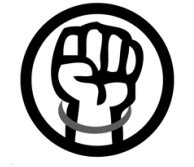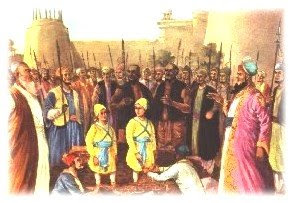I originally posted this in my blog,
The Road To Khalistan. I am also posting it here because I imagine the few people outside of our small, but vibrant, community, have any idea what daily life in an American school can be like to a young Sikh boy. Please read and enjoy. And maybe grow a little. And if you have any questions, please feel free to ask.
I came across this poem one day while reading Preeti Kaur ji's blog,
The World I Stitch. As I read, I saw pictures of all that our children go through in school, especially in America and I felt the need to illustrate her painfully beautiful poem. She has graciously given me permission to reproduce the poem here. The words are hers; I am to blame for the pictures. (She approves of them, though!)
I would suggest that any children experiencing such problems, go to
Khalsa Kids. There is a lot of help there. Parents are welcome, too, of course!
where ever it is dark (revised, kid-friendly version) 12/7/07
for r. singh (especially) and children everywhere
after school
i tell my mummy
i don't want to go back
tomorrow
she asks me why
i tell her
today in the playground
bullies
push me
punch me
kick me
shout at me
potato head!
raghead!
alladin!
even osama bin laden!
everything i know
i am not

i fight back
throw a fist

imagine the bullies as monsters
call them ugly things too
my cheeks burn
my heart thumps
i am MAD

i didn't start this
i am just one
and no one listens
when i yell
stop it!
leave me alone!
no one helps me
when the bullies
rip the cloth
from my head
pull off
my patka

not even the friends
i swing with
everyday on the monkey-bars
or the kids
who swap sandwiches with me
in the cafeteria
not even the adults
who patrol the playgrounds
to make sure
everyone follows the rules

after
bloody noses
bruises
scratches
the teachers sit us down
a peace negotiation
where no one questions
the bullies
why am i a target?

inside
i am like a match
like the ones my daddy warns me not to play with
a blue flame
which grows shorter every second
burning my insides
faster than i expect

i go home
and cry
and cry
i tell my mummy
everything
my mummy
wraps her arms
around my shoulders
tells me she loves me
with her eyes
she unwraps
my joora
lets loose
my long hair
runs her fingers through

mummy whispers
your hair
is like the night sky
your hair
is the universe

she combs my kes
with a kanga
twists my hair firm
on the top of my head
a galaxy you carry high
mummy says

she takes the square patka cloth
angles it
like a diamond
sets the patka on my scalp
and ties it tight
mummy tells me
this patka
crowns you
one day
you will wear a turban
cloth as long as the seven oceans
the full span of the earth
will rest on your head

be a brave young prince
like Sahibzaada Zorawar Singh Ji
like Sahibzaada Fateh Singh Ji
when bullies
big as kings
threaten them
for carrying the universe on their heads
like true princes
when bullies
torture them
with three nights
in the cold
in the dark

when everyone wanted them to just be children
they raised their chins high

no tears
just the ways of the lion prince

with questions and conversation
a duty for the kingdom
mummy kisses my cheeks
i kiss her back
i tell her
i will go back to school tomorrow
i will be like a prince
a shooting star

bright and brave
where ever it is cold
where ever it is dark

pk










































